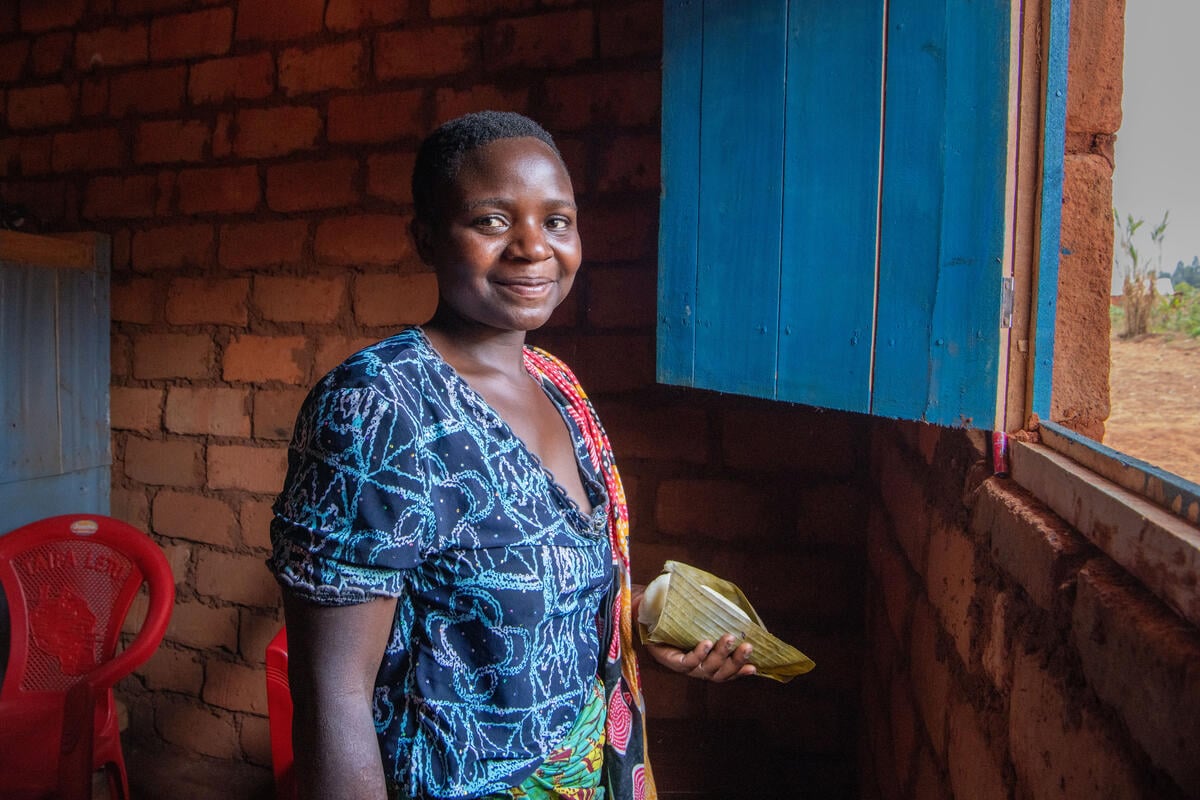Hopeful Central African refugees return home from DR Congo
Dressed in an embroidered African print shirt tailored especially for the occasion, Firmin, 36, walked with his family across the wet tarmac of Gbadolite city airport towards a waiting United Nations Humanitarian Air Services (UNHAS) plane on a one-way trip home.
Earlier that November day, a downpour, perhaps a shower of blessing, had accompanied Firmin and 40 fellow Central African refugees on a 45-kilometre journey to the airport across rugged terrain from Inke camp, in the North Ubangi province of the Democratic Republic of Congo (DRC). The camp had been their home since fleeing armed conflict in the Central African Republic (CAR) in 2013.
“It is really a strong emotion, to finally go home after eight years,” Firmin said. “We have three children who have never met their grandparents and uncles. Seeing them again after all this time will be fantastic.”
As they waited to take off on the short half-hour flight, Firmin’s wife, Victoire, cuddled their baby and checked on their other children, while his own thoughts drifted back to the time when he and his family were forced to flee for their lives.
“I was in the neighborhood of Obongo in the capital city of Bangui,” he recalled. “People were killed everywhere. And there were bullets whizzing around, people weeping, screaming, dying on the ground. It was very hard to bear.”
More than 200,000 people fled CAR to neighboring DRC after a violent armed conflict broke out in 2013 when an armed group, the Seleka coalition, seized the capital Bangui. While the peace process in CAR is ongoing, the situation has calmed enough in some areas for many who fled to make the decision to return home.
Voluntary returns began in July 2019 but were halted due to COVID-19 and a resurgence of electoral violence in CAR in December 2020. They resumed in October 2021, when UNHCR, the UN Refugee Agency, and its partners facilitated the voluntary return of over 5,500 Central African refugees from the Inke, Mole and Boyabu camps in DRC’s North and South Ubangi Provinces.
In 2022, UNHCR plans to continue to support voluntary repatriations for an estimated 20,000 refugees who have expressed their desire to return to areas of CAR assessed as safe. UNHCR is thankful for all of the government, civil society and host community efforts that make both the reception of refugees and their return in safety and dignity possible.
- See also: UNHCR, States vow to step up support for solutions for those displaced by Central African crises
Firmin and his family spent the past eight years in Inke camp, far from the insecure border area between the two countries. There are approximately 18,000 CAR refugees in Inke who have access to clinics and hospitals, schools, clean potable water and basic hygiene facilities such as toilets and bathrooms. Firmin received tools to help him feed his family and build a home which provided a roof over their heads.
With training from UNHCR’s partner Association pour le Developpement Social et la Sauvegarde de l’Environnement (ADSSE), Firmin eventually became a teacher in the local school. While he was grateful for these opportunities, the conflict in CAR destroyed his dreams of studying geography at university.
At the multi-media center at the camp, Firmin and his compatriots kept abreast of the developments back home. With peace gradually returning to some areas, an increasing number of refugees expressed an interest in returning to CAR.
“It is my country. We were following the news in real time, so I knew the time was right, finally, to go back and reach my family again,” Firmin said.
When they touched down in Bangui, Firmin and the other returnees were welcomed by the Government and UNHCR. After the immigration formalities and the disbursement of money for transport to their final destinations, Firmin and his family reached his wife’s childhood home in Bangui. Firmin was overwhelmed by the changes to his hometown in the intervening years.
“As we passed through the city we saw old houses, new houses, [and] a huge traffic jam, because there are lots of people,” he said. “The population has increased dramatically in Bangui.”
On arrival at his in-laws’ house in Bangui, Firmin’s family was welcomed with coffee and a traditional dish of “chinchard” fish to celebrate their long-awaited return. Without a local phone connection, Firmin’s own family were initially unaware of his long-awaited return, but after buying a SIM card he finally contacted them to give them the happy news.
Despite the relief of being home, returnees like Firmin still face many challenges as most of them return to CAR as they left – with close to nothing.
To ease the transition, UNHCR facilitates cash for transport, essential items and food to each returning family. The CAR government offers access to documentation services. However, more support is needed to provide longer-term solutions that will help returnees restart their lives.
“The support given by UNHCR will help us to settle down, but afterwards I will need to find another job for us to survive,” said Firmin.
He believes that CAR refugees returning from neighboring countries will have a key role to play in the future of the country.
“I would like to urge my refugee brothers who are still outside the CAR to be courageous and come back home to work on the development of our country. The same courage, the same resilience that we have shown during our stay abroad is the strongest asset we have to give our country.”














